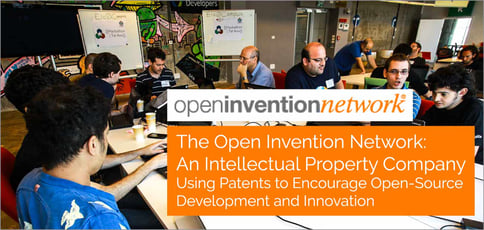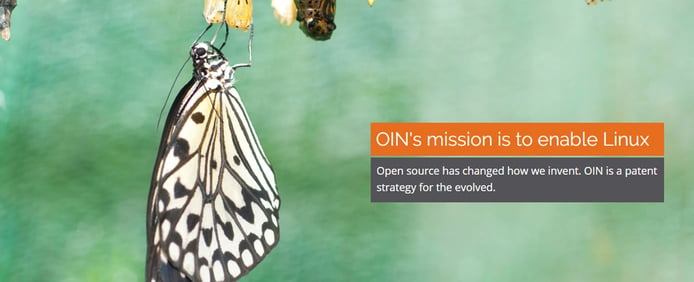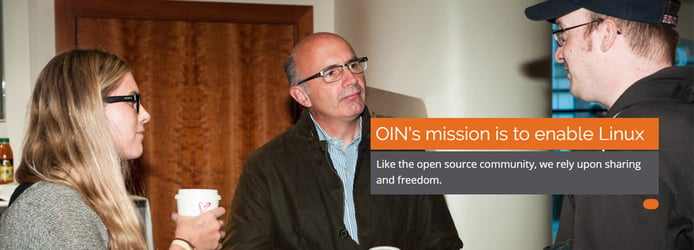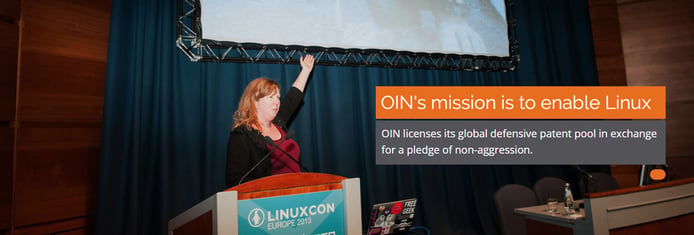
TL; DR: The Open Invention Network (OIN), founded in 2005, is an intellectual property company promoting open-source technology through a patent non-aggression community. The industry-backed group is working to drive innovation by removing risk and encouraging collaboration in the Linux ecosystem. With a future focus on expanding the company’s defensive scope against non-practicing entities, OIN is poised to help the open-source community continue to thrive, benefiting consumers, investors, software vendors, and emerging markets.
At first glance, the term co-opetition — a mashup of cooperation and competition — seems nothing more than an oxymoron. But in the open-source software world, it describes an approach that’s vital to success.
Because the decentralized software-development model is powered by peer production, the innovations of one open-source entity benefit the whole. Those innovations can then be taken into the marketplace and leveraged in a competitive nature.

OIN is on a mission to remove the risk associated with Linux through a royalty-free patent non-aggression license.
The Open Invention Network (OIN), an intellectual property company founded in 2005, provides a free patent non-aggression cross-license in the Linux system that makes co-opetition within the industry legally possible.
“Co-opetition is a game theory concept in which we cooperate so that we can compete more effectively,” said Keith Bergelt, CEO of OIN. “Patents owned by OIN are available for free to anyone who signs the license. This enables companies to invest in Linux without worrying about intellectual property issues, fueling innovation and economic growth.”
In the 14 years since its inception, OIN has received significant backing from industry leaders, including its eight funding members: Google, IBM, NEC, Philips, Red Hat, Sony, SUSE, and Toyota. Today, it is the largest patent non-aggression organization in existence.
With a future focus on expanding the company’s defensive scope against non-practicing entities, OIN is furthering its commitment to driving innovation through the collective intelligence of a global community.
A Linux-Based Patent Non-Aggression Community
Keith told us that OIN is part of a more substantial social transformation in which collaborative innovation transcends the limitations of traditional, siloed environments. When the alliance was first formed in 2005, its main challenge was overcoming the resistance associated with that change.
“We were founded 14 years ago to deal with the threat posed by large patent-holding companies that were antagonistic to Linux and open-source at the time,” he said. “Many didn’t understand its value and utility and were not capable emotionally or intellectually of integrating open-source into a typically proprietary environment.”
These companies would take legal action in an attempt to discourage others from adopting open-source code and participating in related projects. Keith said that type of threat has now subsided, making way for a more veiled form of risk.
“It’s a more diffused threat now, coming from operating companies that live on the wrong side of history, as well as non-practicing entities that own patents which were previously owned by large operating companies seeking monetization.”

Launched in 2005, OIN paves the way for cross-industry innovation via open-source software.
Overall, Keith said corporations now recognize and accept the duality between cooperation and competition inherent in the open-source model. “We’re the guardian of a way of creating value, and the output of that is innovation in software,” he said.
In October 2018, Microsoft joined the OIN community, underscoring the importance of open-source software to its future growth. Keith told us he anticipated this move as inevitable decades ago — though many scoffed at the idea at the time.
“Microsoft’s participation in OIN adds to our strong community, which, through its breadth and depth, has reduced patent risk in core technologies, and unequivocally signals for all companies who are using OSS but have yet to join OIN that the litmus test for authentic behavior in the OSS community includes OIN participation,” Keith stated in a press release.
Fostering an Environment Ripe With Linux Innovation
Over the years, Linux has proven itself as a reliable, scalable, affordable solution enabling businesses of all kinds to deploy high-performance software with functionality that was previously limited to large enterprises.
As it became clear that the pathway to innovation was paved with Linux, patent non-aggression began to drive new software solutions in a range of industries. Automakers, for example, are now leveraging the Internet of Things (IoT) to provide more internet connectivity from within vehicles.
In July of this year, Groupe Renault joined OIN, demonstrating its commitment to using open-source software when developing smart vehicle systems. The company follows in the footsteps of a growing pool of automakers that have embraced the consortium in recent years, including Ford, GM, Hyundai, Kia, Mazda, Subaru, and Toyota. Many of these companies are also involved with Automotive Grade Linux, an effort by The Linux Foundation to standardize an open-source software stack for modern cars.

OIN establishes a code of conduct for the use of patents in an open-source centered world.
Keith said The Linux Foundation and OIN have maintained a close relationship as the two organizations work to achieve shared goals. “OIN has become a natural partner with The Linux Foundation as it set up new projects and brought in billions of dollars to support collaborative development over the years,” he said.
On the financial services side, Fintech — a wave of new technology that aims to disrupt traditional approaches in the sector — continues to face slow adoption. “We have many communities that have historically only had a toe in the water when it comes to open-source, such as finance and banking,” Keith said.
A number of finance companies have joined OIN, but few banks have taken the leap. In the meantime, OIN is keeping an eye on projects like Hyperledger, a global, open-source collaboration launched by The Linux Foundation in December 2015 to support the development of blockchain technologies.
The organization also expects advancements in IoT environments to increase members, as a majority of IoT and Industrial Internet of Things (IIoT) applications rely heavily on Linux. In July, OIN welcomed Moxa, a leading provider of industrial edge-to-cloud connectivity solutions, into the organization, paving the way for other industrial-grade open-source platforms.
On the Horizon: Growing Membership and Expanding Defense Efforts
Moving forward, OIN will focus on welcoming an onslaught of companies that have opened their eyes to the necessity of introducing open-source software to its rapidly growing community.
“We have thousands of companies to bring in — software is an important differentiator across industries, not just in the IT space,” Keith said. “At the same time, OIN will focus on expanding its defensive scope against non-practicing entities.”
The consortium is also looking into ways it can make it easier for companies to take the OIN model and use it in the application layer, which is much higher in the tech stack than where OIN operates.
“Google has essentially done this with an OIN ‘light’ model, basically limiting risk by agreeing to a cross-license in the application space related to Android and Chrome,” Keith said. “So, here and there, we will be involved in helping companies become more effective in complementary activities that help reduce patent risk.”
Finally, OIN will continue to do its part in shifting the general mindset around the power of Linux and other open-source software in spurring innovation.
“Few companies are going to survive five to 10 years from now if they define themselves by their hardware — software is the true differentiator,” Keith said. “Ultimately, open-source needs to be integrated within the fabric of a company’s products in order to innovate at the levels necessary to be able to retain customers.”
HostingAdvice.com is a free online resource that offers valuable content and comparison services to users. To keep this resource 100% free, we receive compensation from many of the offers listed on the site. Along with key review factors, this compensation may impact how and where products appear across the site (including, for example, the order in which they appear). HostingAdvice.com does not include the entire universe of available offers. Editorial opinions expressed on the site are strictly our own and are not provided, endorsed, or approved by advertisers.
Our site is committed to publishing independent, accurate content guided by strict editorial guidelines. Before articles and reviews are published on our site, they undergo a thorough review process performed by a team of independent editors and subject-matter experts to ensure the content’s accuracy, timeliness, and impartiality. Our editorial team is separate and independent of our site’s advertisers, and the opinions they express on our site are their own. To read more about our team members and their editorial backgrounds, please visit our site’s About page.

